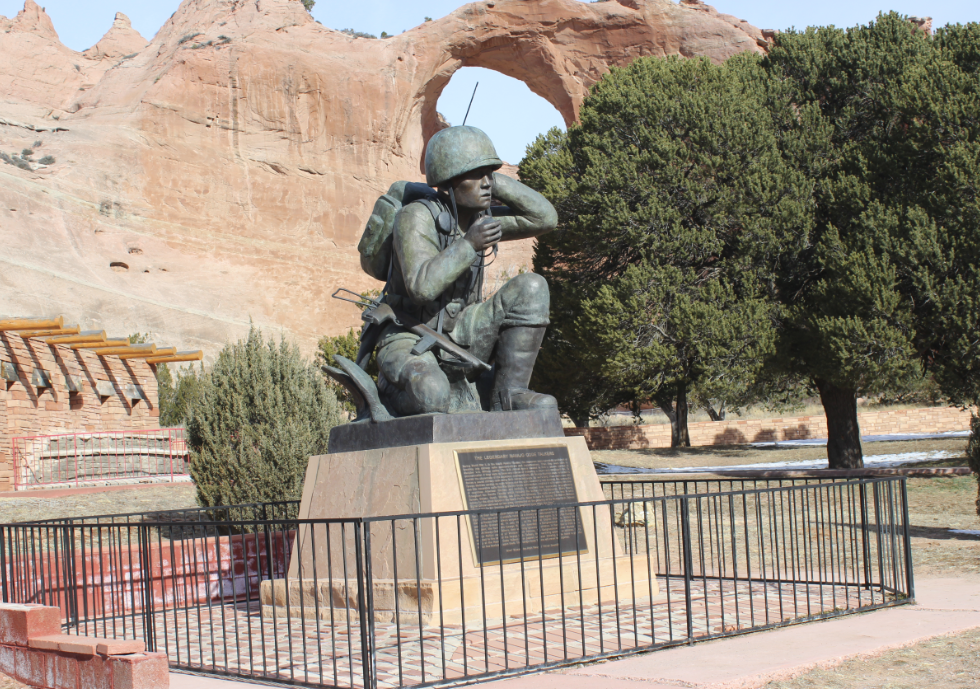
- Details
- By Levi Rickert
Navajo Nation President Buu Nygren on Wednesday said his office received word from the the White House that the Department of Defense will restore materials related to the Navajo Code Talkers on its website.
The restoration announcement came two days after an exclusive article was published by Axios reported that at least 10 articles mentioning the Code Talkers that had disappeared from the U.S. Army and Department of Defense websites as of Monday.
“White House officials reached out to my office and confirmed that removal of 'Navajo' from the agency websites was a result of an error caused by the Artificial Intelligence (AI) automated review process associated with Diversity, Equity, and Inclusion (DEI) initiatives,” Nygren said in a statement.
Nygren said the restoration was made possible through the dedicated advocacy of the Navajo Nation Washington Office and his letter to the Department of Defense.
“I want to assure the Navajo people that we remain in close communication with federal officials to ensure the legacy of our cherished Navajo Code Talkers is never erased from American and Navajo history,” Nygren said.
Nygren finished his statement by saying, “As sovereign nations, we are not defined by DEI classifications. We are political sovereigns with treaties and a long-standing relationship with the U.S. government.”
The 25th Navajo Nation Council weighed in on the matter on Wednesday as well.
“The Pentagon acknowledged the removal as a “mistake” and has since restored much of the deleted content. The DoD explained that the removal was part of an automated process to comply with the DEI policy directive. While some pages have been restored, others remain offline, replaced by server errors. The Pentagon has promised to resolve the issue fully,” the Council said in a statement.
"The restoration of the Navajo Code Talkers' articles is a necessary step, but it does not erase the harm caused by their initial removal. The service of the Code Talkers was crucial to the success of World War II, and their legacy must be continually recognized and honored, beyond any political agenda,” said Speaker Crystalyne Curley.
More Stories Like This
NCAI Passes Two Emergency Resolutions on Immigration Enforcement ActivitiesChickasaw Lighthorse Police Officer named Indian Country Law Enforcement Officer of the Year
Indian Gaming Association Rallies Broad Coalition Against Sports Event Contracts It Calls Illegal Threat to Tribal Sovereignty
Navajo Resources and Development Committee Issues Notice on Livestock Inspection Requirements
American Prairie, Tribal Coalition Files Protest Over Rescinded Grazing Rights
Help us defend tribal sovereignty.
At Native News Online, our mission is rooted in telling the stories that strengthen sovereignty and uplift Indigenous voices — not just at year’s end, but every single day.
Because of your generosity last year, we were able to keep our reporters on the ground in tribal communities, at national gatherings and in the halls of Congress — covering the issues that matter most to Indian Country: sovereignty, culture, education, health and economic opportunity.
That support sustained us through a tough year in 2025. Now, as we look to the year ahead, we need your help right now to ensure warrior journalism remains strong — reporting that defends tribal sovereignty, amplifies Native truth, and holds power accountable.
 The stakes couldn't be higher. Your support keeps Native voices heard, Native stories told and Native sovereignty defended.
The stakes couldn't be higher. Your support keeps Native voices heard, Native stories told and Native sovereignty defended.
Stand with Warrior Journalism today.
Levi Rickert (Potawatomi), Editor & Publisher


